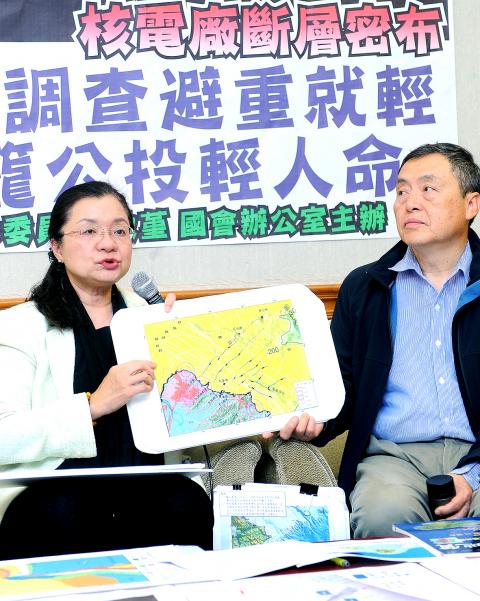|
Ma broke pledge on nuclear safety,
lawmakers say
By Chris Wang and Lee I-chia / Staff reporters

Democratic Progressive Party
Legislator Tien Chiu-chin, left, and National Taiwan Ocean University applied
geosciences professor Lee Chao-shing hold a map showing how close Taiwan’s
nuclear power plants are to geological faults during a press conference in
Taipei yesterday.
Photo: Chu Pei- siung, Taipei Times
President Ma Ying-jeou’s (馬英九)
administration has betrayed its pledge to make the safety of the controversial
construction of the Fourth Nuclear Power Plant in Gongliao Dictrict (貢寮), New
Taipei City (新北市) a priority by sending the Chinese Nationalist Party’s (KMT)
referendum proposal to the legislature’s plenary session, the pan-green camp
said yesterday.
The Legislative Yuan’s Procedure Committee, in which the KMT enjoys a majority,
on Monday listed the referendum proposal initiated by KMT Legislator Lee
Ching-hua (李慶華) on the agenda for the plenary session on Friday.
The move was interpreted by the Democratic Progressive Party (DPP) and the
Taiwan Solidarity Union (TSU) as a violation of a pledge that Ma and Premier
Jiang Yi-huah (江宜樺) made last month, which promised “no nuclear safety, no
nuclear energy” to the public.
The government had said a national referendum on the controversial nuclear power
plant would only be necessary after nuclear safety, an issue of the quality of
the plant’s construction and disposal of nuclear waste, was assured, DPP
Legislator Yeh Yi-jin (葉宜津) said.
“However, it appeared that Ma hinted in his interview with the media on Friday
that nuclear safety would be a separate issue from the referendum, which means
that a national referendum will be held regardless of whether nuclear safety is
assured,” Yeh told a press conference.
Asking people to vote on the nuclear power plant without sufficient information
and professional assessment would be unfair, she added.
The safety concerns over the nuclear power plant will not be addressed within
the next six months because the government did not begin its safety review until
recently, Yeh said.
DPP Legislator Chen Ou-po (陳歐珀) said the referendum proposal should be initiated
by the Executive Yuan, rather than a KMT lawmaker, because the legislature is
not obligated to endorse the controversial referendum.
Legislative Speaker Wang Jin-pyng (王金平) yesterday said the plenary session could
either send the proposal to a specific committee, proceed directly to a second
reading or send it back to the Procedure Committee.
The TSU caucus, meanwhile, said that the KMT’s insistence on holding the
referendum was a political calculation based on the high threshold required for
a referendum to pass and on manipulating the referendum question.
The referendum should not be held before three nuclear-related bills currently
in the legislature are dealt with, including a bill on referendums in evacuation
zones, a bill on promoting a nuclear-free homeland and an amendment to the
Referendum Act (公民投票法), it said.
Separately yesterday, DPP legislators Tien Chiu-chin (田秋堇) and Huang Wei-cher
(黃偉哲), together with several academics, once again stressed that the nation’s
geography is not suitable for nuclear power plants.
Ahead of an ad hoc meeting to be held by the legislature’s Economics Committee
today about Taiwan Power Co’s (Taipower) geological survey on the three
operating nuclear power plants, the legislators and academics said reports show
that all of the nuclear power plants are near faults, volcanoes and underwater
volcanoes — all seismically unstable areas.
National Taiwan Ocean University professor of applied geosciences Lee Chao-shing
(李昭興) said the Shanjiao Fault (山腳斷層) that stretches from the Jinshan Fault
(金山斷層) has been found to be at least 40km, and it may be found to be even be
longer if further geological surveys are conducted in other areas.
He said the Jinshan Nuclear Power Plant in Shihmen District (石門), New Taipei
City, is only 7km from the Shanjiao Fault, the Guosheng Nuclear Power Plant in
the same city’s Wanli District (萬里) is only 2km from the Kanjiao Fault (崁腳斷層)
and the Ma-anshan Nuclear Power Plant in Pingtung County’s Ma-anshan (馬鞍山) is on
the Hengchun Fault (恆春斷層).
The yet-to-be completed new plant may be on the Fangjiao Fault (枋腳斷層), Lee
added.
“Taiwan is the only country that builds nuclear power plants on faults, and near
volcanoes and its capital,” Tien said, adding that while the government
repeatedly promised that nuclear power generation will only begin when nuclear
safety is ensured in advance, the geological survey shows that the plants are
not safe.
|
![]()
![]()
![]()